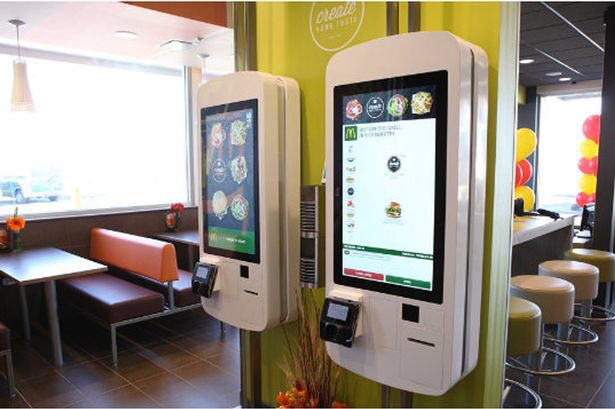Fighting for $15? Believe that it won’t significantly change employment patterns at restaurants? Well, according to a survey released ea...
Fighting for $15? Believe that it won’t significantly change employment patterns at restaurants? Well, according to a survey released earlier this month, you can eat your heart out — provided, of course, you can find a server.
According to the survey by Harri, a company that provides workplace management software for the hospitality industry (including, of course, restaurants), 64 percent of restaurants say that they’ve reduced employee hours and 43 percent say they’ve eliminated jobs since higher minimum wage laws went into effect in their states.
The report, released April 10, included “a wide range of restaurant operators from approximately 4,000 restaurants and over 112,000 employees across the U.S.,” drawn from 173 chains and other outlets.
“Central to the report is analyzing the impact that new minimum wage legislation, enacted by states across the U.S., is having on the restaurant industry, and how operators responded to these new laws,” a Harri news release stated.
The impact is clear.
“Restaurants and hospitality organizations across the country are facing unprecedented challenges in maintaining the economic integrity of their business,” Luke Fryer, the founder and CEO of Harri, said in the release.
“Since nearly 50 percent of states imposed changes to the minimum wage policy on January 1st, 2019, markets like New York have been driven into a recession-like environment.
“These findings reveal an alarming industry snapshot as many operators are forced to make lose-lose decisions, including reducing employee hours and even eliminating jobs altogether. Ironically, the legislation that was intended to improve employee conditions in the hospitality industry is having a direct, adverse effect.”
The report found that 45 percent of restaurants surveyed saw labor costs go up by 3 to 9 percent, with 26 percent showing an increase of between 9 and 15 percent. Twelve percent of restaurants surveyed saw costs go up by over 15 percent.
And guess who pays for that? You, of course: 71 percent of outlets also say they had raised prices due to the increase in labor costs.
“In a people-centric industry that so heavily relies on its employees to drive sales and customer satisfaction, wage inflation pressures are forcing operators to make harmful, short-sighted decisions to offset rising labor costs,” Fryer said in the release.
“Whilst we’re an advocate of a steady and incremental rise in the minimum wage, it needs to be at a velocity that enables operators to take the right approach and adjust strategically. Instead, the unstoppable onslaught of employee-related challenges are only making our mission more critical than ever to deliver operators tangible, comprehensive solutions to discover labor cost-efficiency, fuel profitability, and drive business performance through employee performance.”
The report comes, as CNBC noted last week, as House Democrats are aiming to pass a bill that would raise the federal minimum wage to $15 an hour from the current $7.25. The legislation is profoundly unlikely to become law, but it’s potentially an issue we’ll see on the campaign trail in the coming year.
Meanwhile, six states have approved laws that would eventually hike the minimum wage to $15 an hour in phased increments. That includes Maryland, where the General Assembly overrode Republican Gov. Larry Hogan’s veto on the matter late last month.
In vetoing the bill, Hogan noted that it would “hurt Maryland’s competitiveness and push small businesses out of the state.”
“A recent study on the issue of a $15 minimum wage concluded that Maryland private sector employment would be reduced by over 99,000 jobs and our state’s economic output would decline by more than $61 billion over the next decade,” Hogan said, according to WBAL-TV.
“This same report estimates that more than half of the job losses would be in small businesses. I am extremely concerned that a dramatic and geographically disproportionate increase in our minimum wage will negatively impact our competitiveness and harm our state’s economy.”
This is economics so basic I can even let Paul Krugman, noted liberal economist and New York Times doomsayer, explain it for me:
“So what are the effects of increasing minimum wages? Any Econ 101 student can tell you the answer: The higher wage reduces the quantity of labor demanded, and hence leads to unemployment,” Krugman wrote in a 1998 book review.
(Krugman directly reversed himself from that reality-based thinking in a 2015 column that backed a minimum wage hike and pushed Hillary Clinton for president. That idea didn’t work out so well either.)
An inability to follow the most basic tenets of economics has disastrous results for low-skilled workers everywhere, especially those in the restaurant business. A study by the University of California-Riverside found that the phased rollout of the minimum wage increase in that state — scheduled to hit $15 in 2022 — had negatively impacted employees in that industry.
“Data analysis suggests that while the restaurant industry in California has grown significantly as the minimum wage has increased, employment in the industry has grown more slowly than it would have without minimum wage hikes,” the study, published earlier this month, states.
“The slower employment is nevertheless real for those workers who may have found a career in the industry.”
If you want to see where this is going, witness the one major restaurant chain that has stopped fighting a $15 minimum wage: McDonald’s.
For other restaurants, it seems, the answer to government artificially inflating the minimum wage is clear: Cut down on hours or employees.
Far from protecting those on the lowest rung of the employment ladder, all the fight for $15 does is punish them.
But it certainly looks good on a candidate’s resume.



Every employee wants more money....but the customers do not want to pay MORE for their food....so restaurant goes out of business.....GREAT IDEA.... https://uploads.disquscdn.com/images/b9f0da52d85bfe0393652ee2858f349d6b290609819b70ab308bb3d6bbf0094d.jpg
ReplyDelete